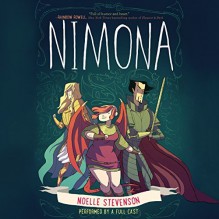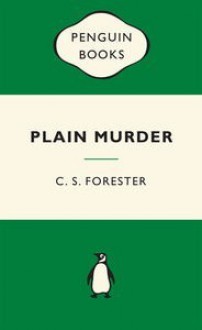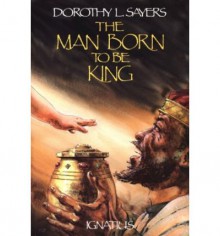
Nimona started off as a free fantasy webcomic and has since been published in graphic novel form (only the first three chapters of the webcomic are still available for free). I read it back when it was a webcomic and remembered enjoying it. I was excited when I heard about the audiobook, but also wary. I mean, it's a graphic novel. How do you turn a graphic novel into an even halfway decent audiobook?
In the case of Nimona, it was turned into something like a radio play, complete with sound effects, a full cast, and a narrator filling in whatever the sound effects and dialogue couldn't get across. For the most part, I thought it was reasonably successful, although I still missed the artwork.
Let me back up a bit. Nimona stars Lord Ballister Blackheart, a villain who wants to cause trouble for the Institution of Law Enforcement and Heroics but who doesn't actually want to hurt anyone, and Nimona, his new sidekick. Nimona is a shapeshifter who thinks being a villain sounds cool, and she's overenthusiastic about her new job. She has a tendency to kill people if Ballister doesn't watch her and rein her in. Ballister's nemesis is Sir Ambrosius Goldenloin, the man who blew off his right arm.
When Ballister learns that the Institution of Law Enforcement and Heroics is involved in a project that may be poisoning the country's crops, he decides to intervene. The situation is complicated by Nimona's secrets and Ballister and Goldenloin's painful history
(they used to be friends, and it's strongly hinted that they were once lovers).
If the names didn't make it clear, there's a good bit of humor in this. I enjoyed Ballister's enthusiasm for the Science Fair, Dr. Blitzmeyer's complete obliviousness to anything that wasn't her area of research, and anything that poked fun at Goldenloin. The story did take a turn for the serious, though, when the full story of Nimona's past was revealed.
For the most part, the voice acting was pretty good. I was iffy about the casting decision for Goldenloin, but I loved the rest of the main cast. The attempt to have sound effects and narration fill in for the original story's artwork mostly worked, although I'm guessing that my past familiarity with the webcomic probably helped. That said, there were a few times when even I had a little trouble following what was going on, usually when Nimona was doing some of her more rapid-fire transformations.
Story-wise, the pacing was a bit weird. As much as I loved Ballister's reaction to the Science Fair, for example, that part came at an odd time in the story. Also, the ending was extremely unsatisfying. I can't remember if I had the same issue with the webcomic, but I recall a few extra illustrations that at least gave the illusion of more closure. And did the webcomic let readers at least know more about
Goldenloin's ultimate fate? Unless I missed it, the audiobook didn't - the last thing that was said about him was that he might not ever wake up again.
All in all, this was better than I expected, but I'd probably still advise newbies to the story to start with the graphic novel and listen to the audiobook only if they love the original work and want more.
Rating Note:
This is my 3-star "I don't even know" rating. I'd probably have rated it higher if it hadn't been for the ending.
(Original review posted on A Library Girl's Familiar Diversions.)

 Log in with Facebook
Log in with Facebook 







